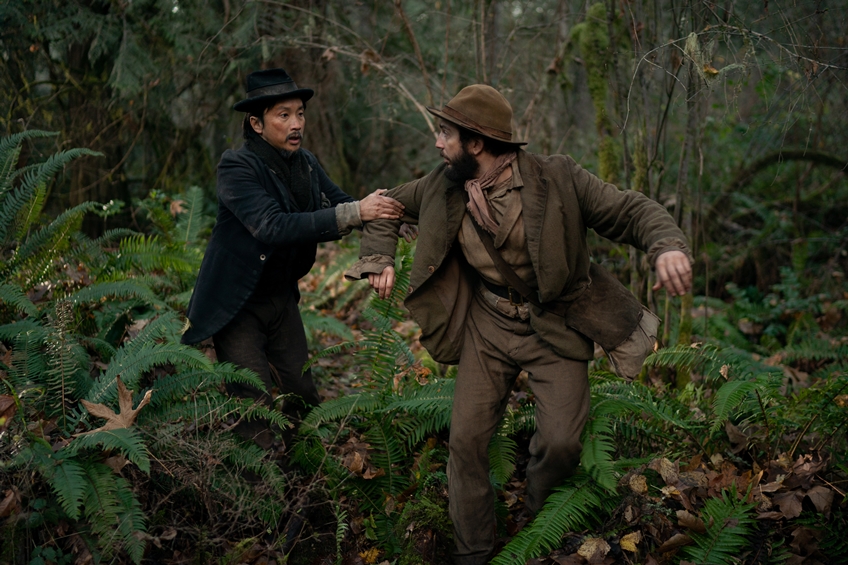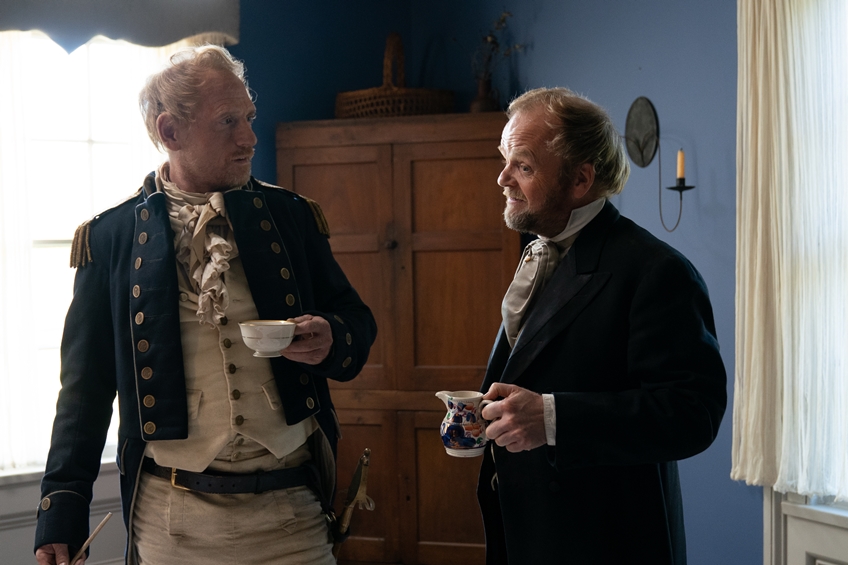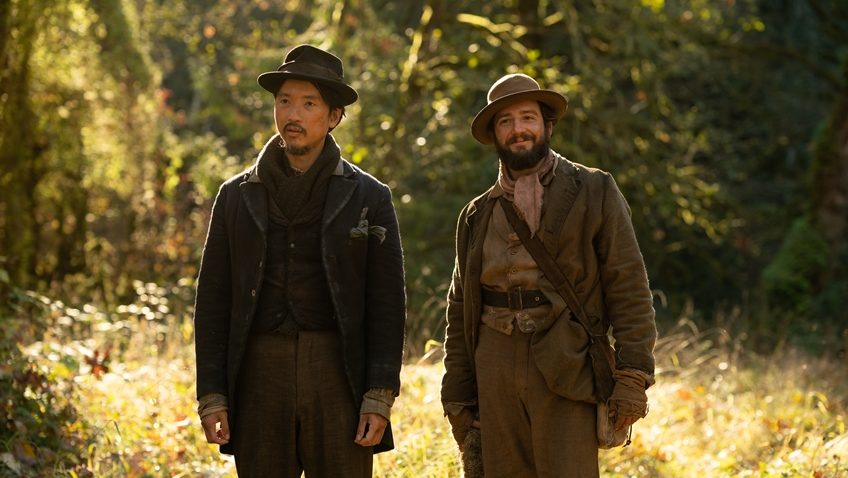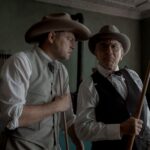First Cow (in UK cinemas from May 28th) Cert 12A, 122 mins. Released on MUBI Channel from July 9th
Kelly Reichardt’s seventh feature film is her fifth to be set in a meticulously depicted Pacific Northwest in various periods. It is also her fifth film to be based on the writings of Jon Raymond, with whom she collaborates on First Cow, the loose, pared-down adaption of his epic novel, The Half-Life, a genre-stretching Western.
The opening title card (also from the source novel) reads: “The bird a nest, the spider a web, man friendship.” It is from the Proverbs of Hell series by William Blake, who illustrated and wrote about the inequalities of society and society’s destructive prejudices: themes shared by this immersive, neo-realist film.
First Cow is the moving story of a “man friendship”, but going back to Blake, both men are caught in a metaphorical spider’s web from which they cannot escape when they raid the nest of a wealthy settler, the English Chief Factor (Toby Jones). The “nest” is in the the form of the Factor’s pedigree cow, imported from California, and instead of eggs, it is the milk of the region’s only cow that they are after.
Peripatetic Cookie Figowitz (John Magaro), who has signed on as the cook for abusive beaver fur trappers, is foraging in the forest when he discovers a naked, Asian sailor, King-Lu (Orion Lee), shivering, starving and wary. To the surprised, but politely inquisitive Cookie, Lu explains that he has killed a murderous Russian trader in self-defence and hid his clothes to avoid being tracked down.
King-Lu, who is slight of build with delicate features, and a charismatic air, is a sophisticated world traveller. He claims to have seen exotic lands which burly, hirsute Cookie could only dream about. Soon the two soft-spoken men have set up house in King-Lu’s shack where, in a division of tasks that defies their appearances, King-Lu chops wood and feeds the chickens while Cookie forages and cooks.
Everyone in the melting pot of the 1820 Oregon Territory that Reichardt so persuasively brings to life – Hawaiians, Native American tribes, British (many tied to the Hudson Bay Company), Russians, European Canadian fur traders and “Americans” (Oregon became a state in 1850) – have come to The Territory to make money. Though he is dirt poor King-Lu, who has seen the Pyramids, tells Cookie, ‘This is a land of riches…I see things in this land I haven’t seen before…Everywhere has been touched by now but this is still new.’
It might be new, but the ways of men are not. One thing King-Lu sees is the possibility of the pair making enough money to move on to San Francisco through an illicit entrepreneurial scheme. Cookie has watched the arrival of a cow on a closely guarded barge, much as the Romans watched the arrival of Cleopatra, only this one comes down the Columbia River. Cookie’s mind wanders to recipes enriched by milk. He shares this information with King-Lu who quickly concocts a plan.

The two friends will go out each night to milk the wealthy settler’s cow, which they called Evie, (the connection with the world’s only woman, Eve is apt). And each morning they will go to the outdoor market where men queue up to buy Cookie’s delicious biscuits. When asked about the special taste, the men simply say it’s a Chinese secret. The camera focuses on a lean young military man who is eager to try the biscuits but is turned away resentfully when the vendors run out.
Unfortunately, gentle Evie was brought to the Territory by the colony’s English chief factor (Jones) who lives in comfort with his Native American wife (Lily Gladstone). Cookie’s biscuits remind him of home, and he hires Cookie to cater a tea-party that turns into an uncomfortable debate on beaver furs.
King-Lu is ambitious, daring and optimistic while Cookie is cautious, but allows himself to be led by his resourceful friend. Reichardt’s bleak, but hauntingly beautiful film uses this dynamic to sustain an almost unbearable tension, as the friends go out to milk the cow one last time before making their break for San Francisco.

The suspense is mitigated only by a clue to the friends’ fate shown in a quick opening scene set in the present. Those who have seen Reichardt’s heart-breaking woman and dog story, Wendy and Lucy, will recognise her reference to this 2008 film – if not to the dog, also named Lucy in Reichardt’s Old Joy. First Cow opens with a young woman (Alia Shawkat), dressed in modern-day clothing, making a startling discovery while wandering the Oregon woods with her dog.
Jon Raymond’s novel is an epic journey that spanned 40 years and two continents. There is a feeling that something is lost in the stark compression, although cinematographer, Christopher Blauvelt, makes good use of the 4:30 aspect ratio that he used in Meek’s Cut-Off to highlight the oxymoronic claustrophobic nature of this wilderness and the “man friendship” at the heart of the film. The two perfectly cast characters grow on us. And there is enough here for us to grow very fond of Reichardt’s hapless friends.




